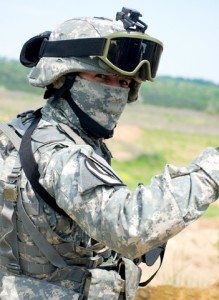
It’s hard to believe, that will all the coverage of The Terminator’s illegitimate child, Katie Couric leaving evening new and Newt Gingrich running for office, that there’s a war going on, but apparently there is. The war in Afghanistan, often known as ‘The Forgotten War,’ has been going on for over a decade and troop morale is reported to be at one of its lowest points. And who could blame them. The troops are overseas fighting, and risking their lives, and the biggest news story is about Arnold Schwarzenegger and his illegitimate child. It’s pathetic!
Here’s a relevant story from Pauline Jelinek of the Associated Press.
WASHINGTON — As fighting and casualties in Afghanistan’s war reached an all-time high, U.S. soldiers and Marines there reported plunging morale and the highest rates of mental health problems in five years.
The grim statistics in a new Army report released Thursday dramatize the psychological cost of a military campaign that U.S. commanders and officials say has reversed the momentum of the Taliban insurgency.
Military doctors said the findings from a battlefield survey taken last summer were no surprise given the dramatic increase in combat, which troops reported was at its most intense level since officials began doing mental health analyses in 2003.
“There are few stresses on the human psyche as extreme as the exposure to combat and seeing what war can do,” Lt. Gen. Eric B. Schoomaker, the Army surgeon general, said at a Pentagon news conference.
Some 70 percent to 80 percent of troops surveyed for the report said they had seen a buddy killed, roughly half of soldiers and 56 percent of Marines said they’d killed an enemy fighter, and about two-thirds of troops said that a roadside bomb – the No. 1 weapon of insurgents – had gone off within 55 yards of them.
Most of those statistics were significantly higher than what troops said they experienced in the previous year in Afghanistan as well as during the 2007 surge of extra troops into the Iraq war, the report said.
Some 20 percent of troops said they had suffered a psychological problem such as anxiety, severe stress or depression. Considering the intense levels of combat they are seeing, that number may actually be small, said Col. Paul Bliese, who led the last three survey teams to the battlefield, in 2007, 2009 and 2010.
“We would have expected to see a much larger increase in the mental health symptoms and a much larger decrease in morale … based on these incredibly high rates of exposure” to traumatic combat events, Bliese said. The report’s authors took the statistics as evidence that the force is resilient, a trait the military has been working to develop in troops.
The report is a snapshot of the health of the forces in Afghanistan last year, drawn by a mental health team that polled more than 900 soldiers, 335 Marines and 85 mental health workers on the battlefield in July and August, as troops surged into the country under the Obama administration’s new strategy for fighting the insurgency.

President Barack Obama sent an additional 30,000 troops there last year to build the force to the current 100,000. Commanders and administration officials say the push has weakened the Taliban, and a limited troop withdrawal is planned by this July.
Troops said they were receiving better training in suicide prevention and other coping strategies and that mental health treatment was easier to get at the warfront.
“I do believe we’re making progress,” Schoomaker said.
But a particularly stubborn problem for the Army persisted: About 50 percent of soldiers said they believe getting professional help for their problems would make them appear weak. Defense officials have gone to great lengths over a number of years to encourage troops to get treatment, and Marines made some headway in reducing the perceived stigma, according to the report.
Americans “have not solved this problem in the civilian world,” said Dr. Robert Heinssen, a research director at the National Institute of Mental Health.
The military says it boosted the mental health staff in the Afghanistan to 1 for every 646 soldiers last year, compared with 1 for every 1,123 in 2009.
“War affects everyone … and most are able to deal with their experiences and move on to stable, productive lives,” said Joe Davis, a spokesman for the Veterans of Foreign Wars. “Key to coping with those experiences is available care, access to care and knowing that you are not alone.”
Some of the report’s highlights:
_ Only 46.5 percent of soldiers said their morale was medium, high or very high last year, compared with 65.7 percent in 2005. For Marines, it was only 58.6 percent last year compared with 70.4 percent when they were surveyed in 2006 in Iraq. (The report compares numbers of the Marine to their time in Iraq because they were not in Afghanistan in significant numbers before the surge.)
_ Nearly 80 percent of Marines and soldiers said they’d seen a member of their unit killed or wounded, compared with roughly half who said that in the earlier years.
_ Nearly 1 in 5 soldiers and Marines reported psychological problems such as acute stress, depression or anxiety last year, compared with 1 in 10 among soldiers in 2005 and about 1 in 8 among Marines in 2006.
_ The use of drugs for mental health or combat stress was lower among soldiers and Marines than among civilians in the same age group. If you or someone know you is suffering with drug and alcohol abuse, consider a drug rehab program as a treatment option.

 So, Defense Secretary Robert Gates just announced that troops will be in Afghanistan until 2014. He announced this on the same day that a Rasmussen poll came out and said that the majority of American’s wanted a withdrawal from Afghanistan within a year (31% wanted an immediate withdrawal).
So, Defense Secretary Robert Gates just announced that troops will be in Afghanistan until 2014. He announced this on the same day that a Rasmussen poll came out and said that the majority of American’s wanted a withdrawal from Afghanistan within a year (31% wanted an immediate withdrawal).